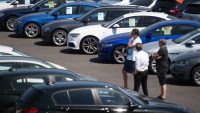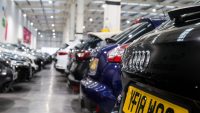If you read the newspapers, it’s been hard to miss the negative electric car commentary that has gained plenty of column inches.
A distinct anti-EV agenda has dominated news pages recently – in the Daily Mail, The Sun and the Daily Telegraph – but is the rhetoric justified?
The negative media coverage of electric vehicles was led by a week-long series of articles in the Daily Mail.
It included front pages with headlines including ‘Put Brakes On Damaging 2030 Petrol Car Ban’ and ‘Proof Politicians Are Out Of Touch On Electric Cars’.
Even yesterday the Mail ran an article about why ‘electric cars are not as green as you think’.
The coverage has led some to question the motivations behind the papers’ headlines, with EV lobby group Fair Charge UK’s spokesman Quentin Willson describing it as ‘an incredible tirade’ and openly questioning what had triggered such ‘relentless negativity’.
In a series of exclusive interviews for this article, Car Dealer spoke to protagonists from all sides to ascertain their motivations.
Ray Massey, Daily Mail motoring editor, pointed Car Dealer to an editorial column he had written explaining his position when asked for comment.
He wrote: “The government’s blind insistence on banning new petrol and diesel cars by 2030 – and all hybrids by 2035 – is nothing short of bonkers.
‘If ministers continue with this blinkered EV timetable then the wheels could come off not only the UK’s motor industry, which employs 800,000 people, but also the wider economy and, with it, the government’s chances at the next election.’
Massey also highlighted the shortage of charging infrastructure and the higher prices of electric cars as further reasons for why the insistence of a 2030 cut-off was inappropriate.
However, Willson fervently disagreed, pointing out that if the UK doesn’t keep the same deadlines as other countries then it will lose its place in the industry’s pecking order.
Today, around 200,000 people are employed directly in car manufacturing, with a further 500,000 employed in the sector.
The car industry generates around £70bn in trade and accounts for 10 per cent of the value of all of the UK’s exports.
‘This is about keeping the UK car industry alive,’ said Willson.
‘If we all want to be diesel-driving dinosaurs we can carry on as we are, but be in no doubt that our car industry will fall behind, lose investment and eventually be irrelevant in global terms.
‘People say that we should maintain free choice – well that’s the price we’ll pay for it.
‘The US, China and Europe are all incentivising the transition – and we need to too. But slowing down would be disastrous.
‘Where this media agenda has come from, I don’t know. But there are a lot of vested interests out there, trillions of pounds worth of them, and this has been building… it’s certainly not a spontaneous campaign.’
It’s a sentiment echoed by Jack Cousens, head of roads policy for the AA, Britain’s largest motoring organisation.
He said: ‘Recently several newspapers have called into question the incoming 2030 ban on new combustion car and van sales, with some demanding the date be pushed out or dropped altogether.
‘I disagree, the UK has the opportunity to be a global leader in electric cars, charging infrastructure and battery production – we should retain the policy.’
Cousens called for the government to focus on the two main barriers to EV ownership – initial purchase cost and the charging infrastructure.
To do this, he suggested reinstating the plug-in grant, introducing a zero per cent loan or removing VAT on electric cars.
He also backed Willson’s suggestion that VAT on public charging should be reduced to five per cent, mirroring the rate applied to domestic electricity costs.
‘It’s hard to know why editors have taken the decision to call into question the 2030 policy,’ he added.
‘Used ICE vehicles will be on the market and new plug-in hybrids will be available until 2035. Until then, companies like the AA will need to fly the flag for EVs.’
Difference of opinion
That opinion drew a bombastic response from Fair Fuel UK lead and London mayoral candidate Howard Cox, however.
‘The traditional, commonsense, objective media are beginning to see the 2030 ban for what it is,’ he said.
‘The government is journeying into an economic armageddon of their own making, all based on a myopic belief that being seen to lead the world to ban the sales of new diesel and petrol cars in 2030 will save the planet.
‘What is even worse, all the independent analyses are telling them that this policy is nothing but political suicide.’
He cited Centre for Economics and Business Research (CEBR) analysis that suggests it will cost at least five times the alleged £76bn of environmental benefits to make the transition, or just under £1,000 for every household per year.
However, it is worth noting that these conclusions have subsequently been questioned after it emerged that the CEBR’s data included the assumption that EV drivers would stand idle while their cars were charging. The majority of EV charging is done at home, while people sleep.
Nevertheless, he adds: ‘Government should immediately remove the threat of the 2030 ban on the sales of new petrol and diesel vehicles.’
It’s a strident view, but – surprisingly, perhaps – one that none of the industries most likely to be impacted by the switch to electrification, and contacted by Car Dealer as part of its investigation, shared. Indeed, they all supported the 2030 and 2035 cut offs so long as sufficient incentives are in place.
Mike Hawes, chief executive of the Society of Motor Manufacturers and Traders (SMMT), and therefore representing the vast majority of car makers in the UK, dismissed the position out of hand.
He said: ‘Manufacturers have invested heavily in widening the range of products they offer and improving the performance they are getting from the batteries.
‘They took the decision years ago to invest in electric cars and have done so now for many years.
‘They need a return on that investment now, not just by 2030, in order to keep investing for the future.
‘The industry, government and society must work together to make it happen and to make it a reality – removing all barriers that they can.’
The National Franchised Dealers Association (NFDA) issued a statement that broadly supported the 2030 and 2035 targets, but admitted it had pushed back against the proposed interim timeline as part of the consultation on the ZEV mandate that will will dictate the proportion of electric cars that must be sold from 2024-2029.
‘Franchised retailers understand the importance of acting against climate change and have invested heavily in driving the electrification of the vehicle parc, helping the Electric Vehicle (EV) market share grow and EV sales increase,’ it said in a statement.
‘However, NFDA has repeatedly voiced its concerns that the government is not doing enough to support franchised dealers and motorists in this transition.’
Even the Petrol Retailers Association, which arguably has most to lose from everyone going electric, declined to attack the 2030 deadline date.
Its statement issued to Car Dealer said: ‘We are committed to embracing the transition towards electrification by 2030.
‘We recognise the importance of adapting to evolving market demands and our members have already taken significant steps in this direction. Many PRA members have already begun installing charging points on their forecourts.
‘However, they do face challenges. One significant challenge is the infrastructure required to deliver sufficient power to their forecourts.
‘Our members have received substantial quotes from their Distribution Network Operators (DNOs) for upgrading power supply. This presents a financial challenge, as the business case for installing charging points may have a longer payback period compared to other investments, such as car wash facilities or expanding shop sizes.’
It did, however, call for more government support: ‘We will continue to collaborate with the government to address the infrastructure challenges and explore viable solutions.
‘While our members are committed to achieving Net Zero, investing in electrification is expensive and the government is yet to provide a strong business case to accompany these investments.
‘In the wake of soaring energy prices and the uncertainty surrounding the government’s net-zero plans, more clarity is needed to justify retailers’ investments in these expensive upgrades.’


































